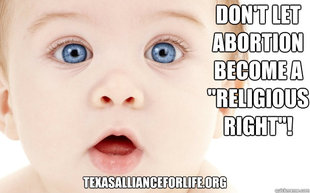Don’t Let Abortion Become a “Religious Right”!
The Texas Religious Freedom Amendment, SJR 4, by Sen. Donna Campbell (R-New Braunfels), and HJR 110, by Rep. Jason Isaac (R-Dripping Springs), is a proposed amendment to the Texas Constitution.

(b) Government may not burden a person’s or religious organization’s Freedom of Religion. The right to act or refuse to act in a manner motivated by a sincerely held religious belief may not be burdened unless the government proves it has a compelling governmental interest in infringing the specific act or refusal to act and has used the least restrictive means to further that interest. A burden includes indirect burdens such as withholding benefits, assessing penalties, or an exclusion from programs or access to facilities.
While 16 states have religious freedom statutes, only one state has adopted a state consitutional amendment (Alabama). Texas would be the second to do so.
Texas Alliance for Life certainly does not oppose the concept of a religious freedom amendment to Texas Constitution. However, we are concerned with the specific language of SJR 4 / HJR 110. Our concern is that a future court could construe this expansive language to find a constitutional right to abortion that could be used to strike down state abortion regulations.
Abortion Neutralizing Language
Texas Alliance for Life strongly recommends adding the following abortion-neutralizing language to ensure that a court could not construe a right to abortion or funding for abortion based on a woman’s sincerely held religious belief:
Nothing in this section confers or shall be construed to confer any right to obtain an abortion or the public funding thereof.
If this language is added to SJR 4 / HJR 110, Texas Alliance for Life will have no further objections.
Basis for Concern
This concern is not merely theoretical, but practical. Federal and state abortion regulations have been challenged numerous times, including in Texas, on religious rights grounds, with some success. Several state and federal courts have upheld the right to abortion or tax funding for abortion as a religious right:
- In Planned Parenthood of Middle Tennessee v. Sundquist (2000), the Supreme Court of Tennessee derived a state constitutional right to abortion from an implied right of privacy that was based at least in part upon the state’s “right to worship” guarantee. That court struck down an informed consent for abortion statute much like the Texas Women’s Right to Know Act.
- In Armstrong v. State (1999), the Montana Supreme Court held that the express privacy guarantee in the state constitution confers a fundamental right to obtain an abortion. In the Court’s view, art. II, § 5, the provision of the constitution that that prohibits the establishment of religious and guarantees the free exercise thereof, “protect[s] . . . the freedom to accept or reject any religious doctrine, including those about abortion . . . .“
- In McRae v. Califano (1980) the United States District Court for the Eastern District of New York declared unconstitutional the Hyde Amendment, which prevents federal tax-funded elective abortions in the Medicaid program, in part based on the Free Exercise Clause of the First Amendment. The Supreme Court reversed in Harris v. McRae (1980) finding that none of the plaintiffs had standing. However, the Court did not reach the merits of the district courts’ free exercise analysis.
This challenge has been raised in Texas.
- In Low-Income Women of Texas v. Raiford, the plaintiffs challenged the Texas Medicaid program’s restrictions on public funding of elective abortion. They claimed the restrictions violated, among other provisions, the “freedom of worship” guarantee of art. I, § 6. The plaintiff were not successful. However, adoption of SJR 4 / HJR 110 would make the success of a similar claim more likely.
The proposed language in SJR 4 / HJR 110 is even more expansive than the language used to challenge abortion regulations in other states. It is also more expansive than the current Texas statute protecting religious freedom, the Texas Religious Freedom Resoration Act, (Chap. 110, Civil Practices and Remedies Code). It is not difficult to imagine how Texas abortion laws could be challenged. Here are examples:
- A minor girl could claim that the State’s parental consent law “burden[s]” her in the practice of her religion, by allowing a third party (a parent or legal guardian) to deny her the opportunity to obtain an abortion that she sincerely believes is allowed by her religion.
- A woman could claim that the State’s Women’s Right to Know law (Chap. 171, Health and Safety Code) is a ”burden” on her religious belief that she should obtain an abortion.
- A non-physician could argue that the State’s requirement that only physicians may perform abortions is a “burden” on her “sincerely held belief that she should perform abortions.
- A Medicaid-eligible woman could argue that her sincerely held religious belief provides a right to abortion and to state tax-funded abortion under the Medicaid program, which is not currently allowed by Texas law.
To defeat these challenges, the State would have to prove the statute or rule promotes (a) a “compelling governmental interest” and (b) that the regulation “uses the least restrictive means available” to achieve that interest, both very high standards.
If a future Texas court interpreted SJR 4 / HJR 110 unreasonably or unfavorably, subsequently changing the Texas Constitution would be extremely difficult.
Other Resources:
- Summary of concerns of Texas Alliance for Life. Click here.
- Testimony by TAL’s executive director Joe Pojman, Ph.D., on HJR 110 to the Texas House Committee on State Affairs, April 3, 2013. Click here.
- Letter from constitutional lawyer Paul Linton on HJR 110 in response to a letter from Douglas Laycock and other law professors. The letter from Linton is here. The Laycock letter is here.
- Letter from Paul Linton on HJR 135, a similar proposed consitutional amendment considered in 2011.Click here.